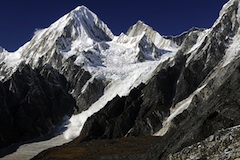Vatican issues sobering report on climate change
May 9, 2011:
 |
 |
 |
Photograph of a glacier by Jan Zalud |
The Vatican’s Pontifical Academy of Sciences is one of the oldest scientific institutes in the world. So when it issues a sobering report on the "serious and potentially irreversible impacts” of climate change, it's worth taking notice.
The report, which was produced by a working group which included leading glaciologists, climate scientists, meteorologists and hydrologists, focuses on the impact of manmade climate change on mountain glaciers and says we have a duty to act now to protect vulnerable communities and the planet.
Veerabhadran Ramanathan of the Scripts Institute of Oceanography at the University of California San Diego – a member of the Pontifical Academy since 2004 and a co-chair of the working group – told the Energy and Environment Daily: “I have never participated in any report in 30 years where the word 'God' is mentioned. I think the Vatican brings that moral authority.”
The report, published on May 5, said all people and nations had to “recognise the serious and potentially irreversible impacts” of manmade global warming caused by greenhouse gas emissions and by changes in forests, wetlands, grasslands and other land uses.
It said: “By acting now, in the spirit of common but differentiated responsibility, we accept our duty to one another and to the stewardship of a planet blessed with the gift of life.
“We are committed to ensuring that all inhabitants of this planet receive their daily bread, fresh air to breathe and clean water to drink, as we are aware that, if we want justice and peace, we must protect the habitat that sustains us.”
Duty to help the vulnerable
It adds: “Our duty includes the duty to help vulnerable communities adapt to changes that cannot be mitigated. All nations must ensure that their actions are strong enough and prompt enough to address the increasing impacts and growing risk of climate change and to avoid catastrophic irreversible consequences.”
The working group recommends three measures to reduce the threat of climate change and its impacts:
1. “Reduce worldwide carbon dioxide emissions without delay, using all means possible to meet ambitious international global warming targets and ensure the long-term stability of the climate system. All nations must focus on a rapid transition to renewable energy sources and other strategies to reduce CO2 emissions.
Nations should also avoid removal of carbon sinks by stopping deforestation, and should strengthen carbon sinks by reforestation of degraded lands. They also need to develop and deploy technologies that draw down excess carbon dioxide in the atmosphere. These actions must be accomplished within a few decades.
2. “Reduce the concentrations of warming air pollutants (dark soot, methane, lower atmosphere ozone, and hydrofluorocarbons) by as much as 50%, to slow down climate change during this century while preventing millions of premature deaths from respiratory disease and millions of tons of crop damages every year.
3. “Prepare to adapt to the climatic changes, both chronic and abrupt, that society will be unable to mitigate. In particular, we call for a global capacity building initiative to assess the natural and social impacts of climate change in mountain systems and related watersheds.”
To read the report, entitled Fate of Mountain Glaciers in the Anthropocene, in full, click here.
BBC One Planet programme
The BBC's One Planet programme went behind the scenes at the Vatican to talk to Marcelo Sanchez Sorondo, chancellor of the Academy of Sciences, about the Vatican's report. The programme is permanently available for you to listen to on the BBC website. Here's a link.
|

